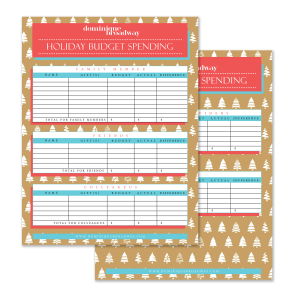How to Save During the Holidays
By America Saves
This time of year can put lots of extra strain on your budget, from costumes and candy for Halloween, to a turkey that feeds your extended family for Thanksgiving, to decorations and gifts galore for Christmas, Hanukkah, and Kwanzaa.
Saving during the holidays doesn’t just mean saving on various elements of the celebrations. It also means sticking to more long-term savings goals and avoiding accumulation of new debt. America Saves has compiled some tips to help you plan for a fun and fulfilling holiday season while not drowning in expenses.
Create a holiday budget
Protect your wallet from impulse buys by developing and sticking to a comprehensive budget for travel, food, entertainment, and gift-giving expenses.
 Set your spending limit before you start budgeting. And stick to your limit. That might mean making some compromises. Think through what you need to make your holiday happy and successful.
Set your spending limit before you start budgeting. And stick to your limit. That might mean making some compromises. Think through what you need to make your holiday happy and successful.- Reduce your spending. Add up the total of your holiday list, and don’t be shy about reducing it some more. Challenge yourself to spend a little less each year.
- Plan for as many expenses as possible.Be as comprehensive as you can as you create your budget. Don’t forget things like holiday tips and year-end giving.
- Remember to save. Continue saving over the holidays so you don’t shortchange your retirement, education, small business, or other goals.
Download our Free Holiday Budget Printable for easy budget construction, and check out additional budgeting tips here.
Get creative with the decorations
Buying decorations definitely can save you time, but creating your own or re-using decorations has many perks. For one, it’s an excellent way to spend time together as a family. It also allows you to put more personal touches on your decorations and holiday props – cheers for sentimentality!

One of our favorites for Thanksgiving is this Thankful Wreath from Better Homes & Gardens. For more ideas, check out these decorative expressions of

Here’s one of 20+ creative uses of Christmas ornaments as decorative elements.

Points to this idea for recycling old baby jars. For more DIY Hanukkah decorations, check out this post by Moms & Crafters.
There are endless opportunities to make your decorations reflect the warmth and cheer of your household.
Go back to basics for holiday dinners
- Keep the menu simple. Dinner can be special without two different meats, four vegetable dishes and three different desserts. If you plan to serve mashed potatoes and gravy, you can skip the macaroni and cheese casserole. If you plan to make candied carrots, no need to serve candied yams also.
- Make a list and stick to it. It’s so easy to go to the grocery store for five items and see chocolate chips, cake mixes and pies on sale that would be a delicious addition to your Thanksgiving table. The power of suggestion is strong, but be stronger and stick to what is on your list so you can stick to your budget.
- Bake instead of buying. It’s much more affordable to buy a frozen turkey that you can thaw and bake rather than going with the fancy catered turkey from specialty food stores. It may take a little extra effort, but the money you save will be worth it.
- Skip the alcohol. If you normally serve wine or other alcoholic beverages on Thanksgiving, consider switching this holiday to other drinks such as tea and sparkling cider.
When it comes to holiday spending, the important thing is to stick to your regular monthly budget, with some necessary additions. We all want holidays to be special, but if you create debt in the process, it will end up being more of a headache than a holiday.
If you’re in search of even more savings tips, check out this Saver’s Guide to Holiday Shopping. Or, if you’re in need of motivation to tighten your budget belt during the holidays, listen to these insights from two economists on the impact of holiday spending on the overall economy.
Spending less is just the first part of a successful financial plan. Put away the money you save during the holidays into a savings account for future expenses, both anticipated and unexpected ones. Those with a savings plan are twice as likely to save successfully. Let America Saves help you reach your savings and debt reduction goals. It all starts when you make a commitment to yourself to save. That’s what our pledge is all about. Learn more about how to save money for the future here.

